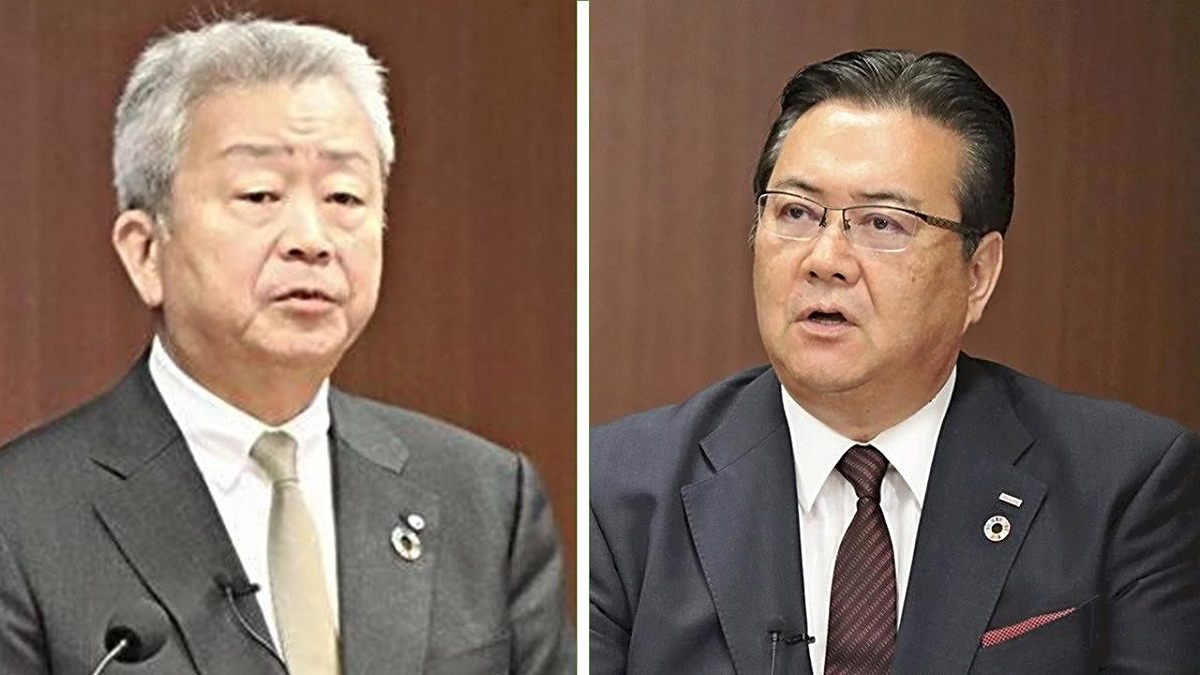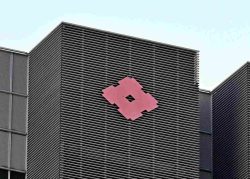
Jun Sawada(L) and Motoyuki Ii(R)
14:29 JST, December 15, 2020
NTT Corp. plans to make NTT Docomo Inc. its wholly owned subsidiary this month, part of its launch of a new group structure.
With American and Chinese firms dominating the global telecommunications industry, NTT believes it can build up its presence through its first reorganization in 28 years.
Motoyuki Ii, who became president of NTT Docomo on Dec. 1, minced no words in a message to employees on the current situation. “Docomo has to change,” he wrote. “I want you to feel a sense of urgency.”
In speaking with people close to him, Ii has referred to the review of mobile phone fees, an issue that has come to the forefront recently, as his “debut fight.” Docomo plans to introduce a new low-cost brand, while also revamping the pricing structure of its flagship brand.
Under pressure from KDDI Corp. and SoftBank Corp., Docomo hopes to win back customers by making them feel like they are getting a deal. This is an idea that NTT President Jun Sawada had previously warmed up to. Sawada and Ii are seen as something of kindred spirits, having both played American football in college.
Sawada and Ii visited Prime Minister Yoshihide Suga at the Prime Minister’s Office on Nov. 27, the day that Docomo’s delisting from the Tokyo Stock Exchange was officially decided, to inform him that Ii would be promoted from vice president of Docomo to president.
Suga, who once served as internal affairs and communications minister and has a strong interest in the telecom industry, reportedly told Ii he is counting on him. The rate reduction is also in line with the desires of the government, NTT’s largest shareholder.
NTT’s plan to make a takeover bid for Docomo began in late April, when the country was under a state of emergency due to the spread of the novel coronavirus.
“If we don’t make Docomo a wholly owned subsidiary, we won’t win to fight another day. I want to hear your thoughts, Mr. Yoshizawa,” Sawada reportedly said during a private meeting with then Docomo President Kazuhiro Yoshizawa in his office on the 44th floor of the company’s headquarters in Tokyo’s Nagatacho district.
Yoshizawa, who is the same age as Sawada and is now a member of Docomo’s board of directors, did not reply immediately. Docomo is proud of its position as the group’s top earner. Still, Yoshizawa shared the belief they would be stronger together. After consulting with executive staff, he decided in May to go along if it would strengthen the group.
Sawada had maintained a sense of dissatisfaction with Docomo since he became NTT vice president in 2014. Docomo’s share of the domestic mobile phone market, which had once been 60 percent, has since declined to a present 40 percent under competition from KDDI and SoftBank. The figures on Docomo subscriber numbers that Sawada saw at monthly meetings steadily declined.
He pressed executives for solutions, but no good answers were forthcoming. The company was also slow to respond to the government’s call to lower rates.
In the late 1980s, NTT was “the No. 1 company in the world” in terms of market capitalization, which represents a company’s value.
However, as the fusion of telecommunications and information technology progressed, the U.S. giants GAFA — Google, Apple, Facebook, and Amazon — and Huawei Technologies Co. of China became the dominant forces. Year by year, NTT’s presence faded.
About half of NTT’s profits now come from Docomo. The only way NTT can keep up with foreign firms is to strengthen Docomo. A takeover bid is seen as the key to NTT regaining its status.
The ¥4 trillion deal — which would be the largest-ever domestic takeover bid — went by the code name “flower project” inside the company. Top executives were able to have frank discussions on the plan through “exchange of opinions” meetings, where, unlike board meetings, minutes were not taken.
Due to the pandemic, regular board meetings have been increasingly held online, but this issue was discussed face-to-face.
Strong concerns have been raised, mainly from outside directors, about the size of the investment, which is about five times the company’s annual net income.
Fortunately, it has been easy to raise funds at low interest rates thanks to monetary easing in place in response to the pandemic. “It might have been impossible in the days of 5 percent interest rates,” one executive said. Gradually, objections to the idea faded away.
The Internal Affairs and Communications Ministry, which has jurisdiction over telecommunications policy, was also aware of the problem.
“NTT and Docomo seemed to be heading in different directions,” one senior official said. “Docomo has been slow to revamp its fees and in research and development.”
Japan’s telecommunications industry is lagging behind the United States, China, South Korea and Europe in developing 5G high-speed and high-capacity communication standards. And while the ministry used to be wary of letting NTT grow too big, nobody has objected to the merger.
On Sept. 29, Sawada and Yoshizawa held a press conference in Tokyo’s Otemachi district to announce the plan to make Docomo a wholly owned subsidiary.
“Docomo has a high market share, but is third in profits,” Sawada said repeatedly.
Yet he vowed to fight back, saying: “Docomo and NTT each have their own research skills. By combining them, we can create technology that will lead the world.”
Top Articles in Business
-

Prudential Life Insurance Plans to Fully Compensate for Damages Caused by Fraudulent Actions Without Waiting for Third-Party Committee Review
-

Narita Airport, Startup in Japan Demonstrate Machine to Compress Clothes for Tourists to Prevent People from Abandoning Suitcases
-

Asics Opens Factory for Onitsuka Tiger Brand in Western Japan
-

JR Tokai, Shizuoka Pref. Agree on Water Resources for Maglev Train Construction
-

KDDI Opens AI Data Center at Former Sharp Plant in Osaka Prefecture; Facility Will Provide Google’s Gemini AI Model for Domestic Users
JN ACCESS RANKING
-

Japan Institute to Use Domestic Commercial Optical Lattice Clock to Set Japan Standard Time
-

Israeli Ambassador to Japan Speaks about Japan’s Role in the Reconstruction of Gaza
-

Man Infected with Measles May Have Come in Contact with Many People in Tokyo, Went to Store, Restaurant Around When Symptoms Emerged
-

China Eyes Rare Earth Foothold in Malaysia to Maintain Dominance, Counter Japan, U.S.
-

Prudential Life Insurance Plans to Fully Compensate for Damages Caused by Fraudulent Actions Without Waiting for Third-Party Committee Review























